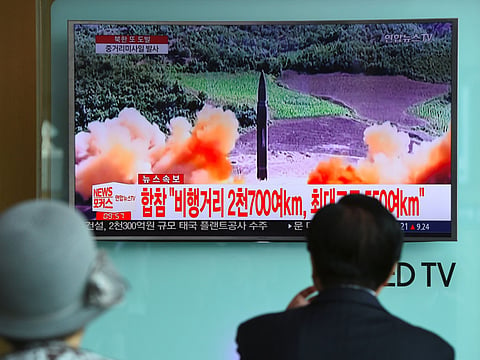Brit-pop and a nuclear standoff
Today’s average South Korean citizen was somehow prepared for the unique alchemy of Trump and Kim — together at last

Within 13 hours of North Korea’s second intercontinental ballistic missile test launch last month, I attended a music festival on the banks of the Han River. Seoul, South Korea, was in the middle of a heat wave, a still, swampy kind of heat oppressive enough that an extreme weather alert had gone out from all major cell carriers several days in a row. “Be sure to stay hydrated,” my phone chirped. “Stay indoors when possible.”
Buoyed by what I admit to be a nonsensically intense love of British electro-pop, I ignored this good advice and struck out across the city. Soon I was sitting, on a patch of matted grass, surrounded by young people in skimpy flowing tops and short shorts, plastic light-up flowers in hair, cups of beverages and selfie sticks in hand. I checked my phone and toggled through the news.
Very few actions in this life, it occurred to me, are less politically urgent than attending a riverside hipster music festival in your hometown. I checked Nikki Haley’s Twitter. A few hundred feet away, the London-based singer-songwriter Nao — in the middle of putting on one hell of a show, any and all spectres of potential nuclear calamity aside — was marvelling at the singing crowd: “How do you know all the words?” she asked, laughing. “You guys are amazing!”
I marvelled, too. I was born in Seoul in 1983 to a Korean mother and an American father and came of age in the Korea of the 1990s, where seeing Korean-Korean (as opposed to Korean-American or whatever other variation) youth partying en masse like this would have seemed as unlikely as presidential nuclear brinkmanship taking place on a microblogging platform.
The cognitive dissonance of business-as-usual against a backdrop of rising urgency reflects life in the information age, when real-time updates on the state of the world renders aggressive compartmentalisation a prerequisite for functioning. That said, these real-time updates have felt particularly relentless this summer in Seoul.
When one is sitting in an apartment some two hours south of the demilitarised zone (DMZ), United States Senator Lindsey Graham’s assurance that any actual casualties will be kept “over there” reads, of course, as “over here”. War games, photos of missile systems and an unequivocal promise of “fire and fury” land similarly close to home.
And yet, all the people in Seoul I spoke to about North Korea over the first few weeks of August revealed themselves to be both startlingly well informed (able to lucidly explain not just North Korean leader Kim Jong-un’s motivation — to protect himself and be taken seriously on the global stage — but also the larger stakes for the US and China) and almost breathtakingly pragmatic.
One friend reported with a chuckle that her elderly mother had begun stockpiling bottled water in a corner of their apartment. “I don’t have the heart to tell her: This is not the war you remember anymore. If the worst happens, we’re just gone. Wiped out. We’re not going to be worrying about staying hydrated.
Writing about the plight of a lover waiting for a beloved, Roland Barthes points out: “The anxiety of waiting is not continuously violent; it has its matte moments; I am waiting, and everything around my waiting is stricken with unreality: In this cafe, I look at the others who come in, chat, joke, read calmly: They are not waiting.”
The US is not used to waiting, at least not as a nation. While the dominant US narrative may well be one of striving, it is largely applied to the individual citizen; our identity is one of fruition rather than anticipation. Korea, unlike the United States, has been waiting a long time. July marked the 64th anniversary of the armistice that ended — or, rather, paused — the Korean War, dividing the nation. The inevitability of a next step, along with its accompanying state of anticipation, has itself been woven into the fabric of South (and North) Korean nationhood since its inception.
None of which is to say, of course, that today’s average South Korean citizen was somehow prepared for the unique alchemy of US President Donald Trump and Kim, together at last. To be waiting for something does not necessarily make one ready for anything.
Over the past five months, the citizens of South Korea have impeached a president, held democratic elections to replace her and participated in tireless (if also, ultimately, fruitless) protests against the installation of the US military’s Terminal High Altitude Area Defence missile defence system. The existential waiting that characterises the South Korean experience is distinct from any sort of political stasis; it is something more like acceptance — an acceptance of the uncontrollable that allows for a redistribution of effort to where it is needed.
Indeed, this redistribution fits the narrative of South Korea’s meteoric rate of development across all modes of production — industrial, technological, even cultural — over the past half-century. Think Samsung, think Hyundai and LG, think high-speed internet and K-Beauty and K-pop. Maybe all this is, in part, the result of approaching each day with an acceptance that the other shoe will, at some point, drop and that life must be lived, regardless.
Or maybe that is a bit of a stretch. Either way, one thing seems clear: Barthes is wrong about the others in the cafe, the ones who chat, joke, read calmly. Some of them are certainly waiting, too; they have simply accepted what they must and chosen to keep doing what they can.
— New York Times News Service
Maya West is a writer and translator who splits her time between Seoul, South Korea, and Ann Arbor, Michigan, US.



